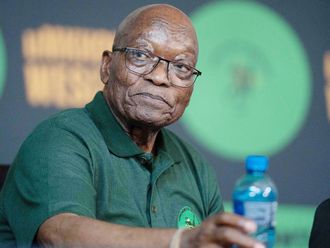Johannesburg: South African President Jacob Zuma made a close associate energy minister on Tuesday as his government tries to push through a big nuclear deal but his sacking of another minister was seen undermining his ANC party’s ruling alliance.
The rand currency and South African bonds fell in value after Zuma’s second Cabinet reshuffle in seven months, with the rand 1 per cent lower on the day against the dollar.
“The market is taking it slightly negative,” said Rand Merchant Bank fixed income specialist Michelle Wohlberg.
Zuma is unpopular with many investors after sacking respected finance minister Pravin Gordhan in March, a move that hit South African financial assets and helped tip the country’s credit ratings into “junk” territory.
He changed six ministers in all on Tuesday, including those for home affairs, education and communications. Blade Nzimande, a fierce critic of Zuma whose South African Communist Party (SACP) is a key ally of the ruling African National Congress, was axed as higher education minister.
The appointment of David Mahlobo, formerly state security minister, to head the energy ministry will heighten speculation that the 75-year-old president is trying to push through the nuclear deal before his second term ends in 2019.
“The appointment of Mr Mahlobo to head up the energy department needs to be seen in the context of the President wanting to push ahead with the proposed nuclear energy programme,” Jeffrey Schultz and Nic Borain, analysts at BNP Paribas South Africa said.
South Africa is preparing to add 9,600 megawatts of nuclear capacity — equivalent to up to 10 nuclear reactors — in a contract that could be worth tens of billions of dollars and would be one of the biggest nuclear deals anywhere in decades.
Companies including Russia’s Rosatom, South Korea’s Kepco, France’s EDF and Areva, Toshiba-owned Westinghouse, and China’s CGN are eyeing the project, which has been criticised by South African civil society groups and the opposition for lacking transparency.
Investors are also worried about the potential impact of the project on South Africa’s already strained public finances.
Former energy minister Mmamaloko Kubayi, who was only appointed in March, was moved to the communications ministry.
SHAKY ALLIANCE Contrary to speculation, Zuma did not appoint Nkosazana Dlamini-Zuma, his ex-wife and former African Union chair, to a Cabinet position ahead of the ANC’s December conference to choose a new leader.
Zuma is said to favour Dlamini-Zuma to take over from him at the party’s helm, instead of Deputy President Cyril Ramaphosa.
But his removal from the cabinet of Nzimande, a vocal critic of Zuma’s scandal-plagued presidency, risked widening a rift with ANC allies the SACP and trade union group COSATU ahead of national elections in 2019.
Nzimande is general secretary of the SACP, which has 17 members of parliament. He has criticised Zuma over his links with the Guptas, a family of Indian-born businessman who have been accused of using their influence to secure lucrative state contracts for their companies.
Zuma and the Guptas have consistently denied any wrongdoing.
“This is a clear declaration of war on the SACP by President Zuma,” the SACP’s first deputy general secretary Solly Mapaila said, although he did not indicate the party would leave the ruling alliance.
ANC Secretary-General Gwede Mantashe acknowledged that Nzimande’s sacking would have a negative effect on relations with the SACP and said relations within the alliance were at “their lowest at this point in time”.












